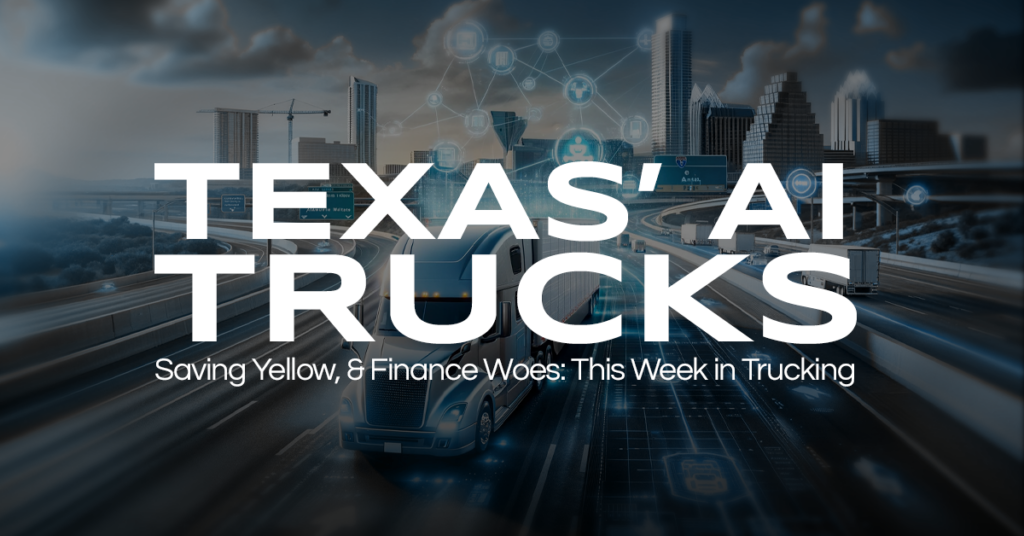
In a rapidly evolving logistics and freight transportation landscape, staying informed is not just necessary; it’s crucial. This compilation offers an insightful glance into the current state of the trucking industry, touching upon key developments that are shaping its future. From the bipartisan effort to rescue trucking giant Yellow, to Texas’ pioneering strides into autonomous trucking, and the revealing study on the risks of trucking finance – each summary encapsulates pivotal moments that are defining the industry. As we navigate through these significant updates, we invite you to delve into the narratives that are not only newsworthy but are also steering the direction of freight trucking and logistics in profound ways.
Bipartisan Push for Yellow’s Rescue
In a recent development, both Republican and Democrat legislators are rallying behind the trucking company Yellow, urging the U.S. Treasury to intervene in its bankruptcy situation. The company, known for its significant presence in the freight trucking sector, received a $700 billion pandemic loan under the Trump administration, which key lawmakers are now seeking to extend. This bipartisan effort includes notable figures like Republican Senator Josh Hawley and Democrats Sherrod Brown and Bob Casey, highlighting the cross-party concern for the company’s future.
A Crucial Loan Extension
The extension of the loan is pivotal for Jack Cooper, a major player in the U.S. auto transport industry, which is attempting to rescue Yellow from bankruptcy liquidation. The proposed plan hinges on the Treasury’s willingness to extend Yellow’s loan repayment deadline from September 2024 to 2026. This extension would enable Jack Cooper to offer more feasible terms, potentially keeping Yellow operational and its workforce employed. The support for this move is rooted in the belief that it’s a sensible step to maintain Yellow’s crucial role in the trucking sector and safeguard its considerable workforce.
The Backbone of U.S. Freight Trucking
Yellow, a leading less-than-truckload carrier in the U.S., is a vital cog in the supply chain, serving major clients like Walmart and Home Depot. Its current predicament, underscored by its $2.59 billion debt against $2.15 billion in assets, has significant implications for the logistics industry. The company’s extensive assets, including thousands of trucks, trailers, and terminals, are on the line, making this situation a critical focus for the Biden administration and the International Brotherhood of Teamsters union, given the potential job losses.
Awaiting Treasury’s Verdict
As Yellow navigates through bankruptcy proceedings, the logistics sector and its stakeholders await a decisive move from the Treasury. The decision, expected later this month, will determine if the loan extension is granted, potentially steering Yellow towards a sale of assets or a more optimistic outcome. This decision is not only crucial for Yellow’s survival but also for the broader logistics industry, reflecting the intertwined nature of major freight carriers and national economic stability.
🔗 Learn more about the future of Yellow and its impact on the logistics industry here
The Dawn of Autonomous Trucking in Texas
In a groundbreaking move, the Texas Department of Transportation (TxDOT) is pioneering an advanced self-driving trucking corridor in the Austin area, signaling a major shift in the logistics and freight transportation landscape. This initiative, led by Cavnue, a company specializing in smart roads, is set to revolutionize the trucking industry. Currently, semi trucks in Texas are operating with a safety driver on board, a precursor to fully autonomous operations. This corridor aims to enhance driver experience and safety by integrating digital roadway information with on-board automated systems, potentially reducing crash rates significantly.
Evolution of Road Transport: Cavnue’s Role and Future Prospects
Cavnue’s involvement extends to monitoring road operations in real time, applying its AI model to interpret road activities, and sharing these insights with both the vehicles and TxDOT. This collaboration is part of Texas’ broader strategy, fostered by previous legislative actions, to welcome autonomous vehicle technology. John Esparza, President of the Trucking Association, views this development as evolutionary rather than revolutionary, emphasizing the gradual yet significant impact on safety and efficiency in the trucking industry. With a similar pilot project already in place in Michigan, Cavnue aims to launch this innovative corridor in Central Texas by mid-2024, navigating the challenges of adapting current roadways to accommodate autonomous vehicles.
🔗 Explore the full details of Texas’s self-driving trucking initiative here
Navigating Risky Waters in Trucking Finance
A revealing study by the Consumer Financial Protection Bureau (CFPB) has spotlighted significant risks faced by truck drivers due to predatory lease-purchase agreements in the trucking industry. Conducted over a year and presented to the Federal Motor Carrier Safety Administration’s (FMCSA) truck-leasing task force, the study highlighted how such agreements often lack transparency and place undue financial burden on drivers. These findings are especially pertinent to owner-operators and small trucking companies, who are frequently rushed into signing complex financial products that negatively impact their earnings. The CFPB’s involvement, as mandated by its authorizing legislation, underscores the gravity of these issues in an industry central to logistics and supply chains.
The Far-Reaching Impact of Deceptive Agreements
The study uncovered a range of unfavorable terms in truck financing products, with debts often tied to the driver’s employment and controlled by the debt issuer. This situation not only undermines the drivers’ ability to repay but also potentially traps them in a cycle of debt and job insecurity. Key concerns include lack of clarity in agreements, potential misrepresentation by employers, and restrictions that prevent drivers from leaving their jobs. The implications are vast, affecting earnings, credit scores, and overall job satisfaction. These insights are part of a broader examination by the CFPB across various industries, with trucking standing out for the severity of financial challenges faced by its workforce. As the FMCSA aims to improve driver quality of life and retain experienced personnel, addressing these predatory practices is vital for the health of the trucking industry.
🔗 Discover the in-depth findings of the CFPB’s trucking finance study here
Before You Hit The Road…
As we wrap up this edition of our news roundup, we reflect on the dynamic and challenging landscape that those in the trucking and logistics sectors navigate daily. The potential rescue of Yellow, the advent of autonomous trucking corridors in Texas, and the critical insights from the CFPB’s study on trucking finance all paint a picture of an industry at a crossroads. These developments are not just news items; they are signposts pointing towards the future of freight transport and logistics.
How do you see these changes impacting your role in the industry? Share your thoughts and join the conversation below. Don’t forget to check back next week for another edition of Optimum Logistic’s weekly news recap, where we keep you abreast of the latest and most significant industry developments.
If you made it to this part of the article, we’d just like to take a moment to thank you for taking the time to read this weekly recap. Be safe out there and as always, If you’re in search of CDL A, B, or warehouse positions, check out our open positions. And if you need staffing solutions for commercial driving or industrial positions, be sure to explore our offerings.



